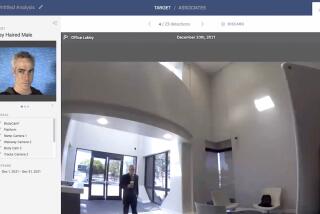Infotec Acquires Firm That Helps Find Missing Children : Diversifying: Software company will give Latino-owned Santa Ana firm a presence in emerging field of forensic identification.
SANTA ANA — Infotec Development Inc. said it has acquired a software company in McLean, Va., that makes “James Bond”-like computerized fingerprint and facial identification systems for law enforcement agencies.
Infotec, a computer services and defense engineering company, acquired QMA Corp. for an undisclosed price in February, said J. Fernando Niebla, chief executive of Infotec.
The acquisition helps diversify Infotec from its dependence on defense contracts, which accounted for 65% of the company’s $68 million in sales last year.
It will also give Infotec, Orange County’s largest Latino-owned company, a strong presence in the emerging industry of forensic identification.
“The field of positive identification has a lot of applications, from law enforcement agencies to access-control systems for buildings,” said Niebla, who said revenues from QMA could grow to 20% of Infotec’s total sales in five years.
QMA’s software, developed with help from forensic experts at the Federal Bureau of Investigation, is being used by the National Center for Missing & Exploited Children, a nonprofit agency in Arlington, Va. The center locates missing children, often by displaying their pictures on backs of milk cartons. QMA’s software on “aging” enables forensic experts to generate computerized projections of what a missing child would look like years after a disappearance. The software incorporates features of relatives and uses forensic formulas to piece together the “aged” images.
Ernie Allen, president of the nonprofit center, said the donated software from QMA helped the agency find 14 missing children out of 150 images generated with the software in the past year. The software was also used to identify the bodies of six children.
“These are cases that the world has forgotten about,” Allen said.
He said the software, used with standard IBM-compatible computers and electronic imaging equipment, could help the center make a bigger dent in its backlog of 9,000 missing children cases, nearly half involving children who have no recent photos because they have been missing longer than two years.
Infotec’s Niebla also said the software is being tested by law enforcement agencies such as Scotland Yard, the FBI, the Drug Enforcement Agency and some police departments.
The agencies can use the technology to instantaneously run cross-references from evidence, such as fingerprints or photographs, and compare them to computerized files of felons. The software also can be used to quickly “sketch” renderings of suspects on computer screens.
James L. Cradduck, senior vice president for corporate development at Infotec, said the identification technology is not new.
But personal computer prices have dropped enough and the software is more sophisticated now, allowing QMA to target even small police departments.
The company began marketing the software kits, which include facial identification and fingerprint recognition capabilities, earlier this year. Prices for the software range from $1,700 to $5,000 per copy. Computer systems could cost thousands more, depending on what equipment is used.
Niebla estimated that QMA will generate about $1.5 million of Infotec’s expected $110 million in revenue for the 1992 fiscal year.
Thomas D. Taverney, chief operations officer of Infotec, said QMA software sales are expected to grow as law enforcement agencies learn the value of the identification technology. No law enforcement agencies in Orange County have yet purchased the software.
“A lot of people think it’s far-out James Bond stuff, so we have to show them it’s here today and it’s affordable,” he said.






